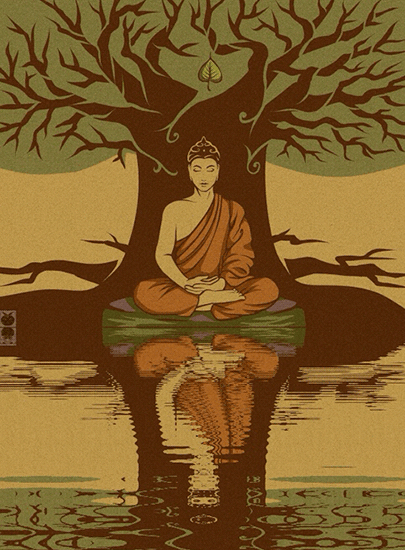-
Comment July 6, 2016
-
“I am in love” vs “I love”
Comment July 6, 2016 -
The only weapon we possess
Comment July 6, 2016 -
Time passes unhindered
Comment July 6, 2016 -
Buddhism and Sex
Comment July 6, 2016Preface
This is the third, further revised version of the original Sangha Guide on Buddhism and Sex published by the English Sangha Trust, Dhammpadipa, London NW3. The greater part of it also appeared in the journal Sangha. As one of the older generation, I have felt very conscious of my temerity in trying to write something on this subject which younger people might be willing to read. In this connection, I am very grateful to Alan and Jacqui James for giving me the benefit of their criticism, a task for which they are doubly qualified, being both wise in the Dhamma and at the same time much closer in age to the younger generation who may read this. But the opinions expressed here are, of course, my own.
— M.O’C Walshe, March 1975
Buddhism and Sex
This is an age in which sexual matters are discussed with great openness. There are many who are puzzled to know what the Buddhist attitude towards sex is, and it is therefore to be hoped that the following guidelines may be found helpful towards an understanding. It is, of course, true to say that Buddhism, in keeping with the principle of the Middle Way, would advocate neither extreme puritanism nor extreme permissiveness, but this, as a guiding principle without further specification, may not seem sufficiently helpful for most people.
In the first place, we must distinguish between the rules undertaken by Buddhist monks for their own conduct, and any guiding principles for lay people.
The Bhikkhu
A bhikkhu, or fully-ordained monk in the Theravada tradition, has taken upon himself a set of 227 rules of conduct. The aim of all of these is to enable him to conduct himself in such a way as is most conducive to the attaining of Enlightenment. The rules are voluntarily undertaken, and if a monk feels unable to live up to them, he is free to leave the Order, which is considered much more honorable than hypocritically remaining in the robe while knowingly infringing the rule. There are four basic rules, infringement of which is termed Parajika or “Defeat,” and involves irrevocable expulsion from the Order. The only one we are concerned with here is the first, which deals with sexual intercourse. Continue reading
-
Ordination of six princes of the Sakya clan
Comment July 6, 201627. Ordination of six princes of the Sakya clan
After the attainment of Supreme Buddhaship by the Great Being,Nanda and many other princes of the Sakya clan became monks under the discipline of the Blessed One. It therefore appeared to those households of the same clan, with two or three sons in each family, that they would be failing in their duty if none came forth to be ordained. The two brothers Mahanamaand Anuruddha discussed this subject, and Anuruddha agreed to be ordained.Bhaddiya, who was then a ruling monarch, happened to be an intimate friend of Anuruddha. Anuruddha therefore went to King Bhaddiya and persuaded him to become a monk along with him, and Bhaddiya agreed. Accordingly, seven of them including Ananda, Bhagu, Kimila, Devadatta and Upali, the barber, came to the Buddha. There they made their request that Upali be admitted first, in order that their Sakya pride might be humbled through having their former attendant as their senior. They were then ordained accordingly.
THE ILLUSTRATED HISTORY OF BUDDHISM
by ASHIN JANAKA BHIVAMSA (Aggamahapandita)
Artist: U Ba Kyi | Link to this post -
Sensual Desire as a Hindrance
Comment July 5, 2016Adapted from a talk by Gil Fronsdal, November 7th, 2004
As rain penetrates an ill-thatched house,
So lust penetrates an undeveloped mind.As rain does not penetrate a well-thatched house,
So lust does not penetrate a well-developed mind.~Dhammapada (13-14)
It is sometimes said that practicing mindfulness is easy; what is hard is remembering to do it. To help us remember, it’s useful to have a clear understanding of the forces in our minds that contribute to our forgetting. The one that the Buddhist tradition focuses on most is desire.
Desire is ubiquitous in human life. Living without wants, wishes, motivations, and aspirations is inconceivable. Some desires are quite healthy, useful, and appropriate; some are not. One function of mindfulness practice is to help us distinguish between these. And differentiating helps support the beautiful aspiration for liberation and compassion.
Any desire, healthy or unhealthy, can easily manifest as a compulsion. Wherever there is compulsion, we are not free. In the West, we sometimes call particularly strong desires “addictions.” Buddhism often refers to compulsive desires as cravings, clingings, or “thirsts.” Careful attention to our inner life, through meditation, for example, will quickly reveal that compulsions are deeply rooted in the mind. Continue reading
-
Rahula following the Buddha and asking for inheritance
Comment July 5, 201626. Rahula following the Buddha and asking for inheritance
While the Buddha was having his meal at his father’s palace. Princess Yasodhara dressed up Rahula properly with ornaments and pointing to the Buddha said, “Behold, son, that great ascetic of majestic appearance in the midst of twenty thousand monks. He is your father. The vases of gold belonging to Him have disappeared since the day he retired from home to homelessness. Go ye and ask for your inheritance so that you may become a Universal Monarch”. Young Rahula, emboldened by the love of a son towards his father, came to His presence and said, “O, father, your shadow is cool and pleasant. I wish to become a Universal Monarch. Please give me my inheritance”. He asked for his inheritance, uttering much else that was becoming. He followed the Buddha when he went back to the monastery asking for inheritance. But the Blessed One made him owner of an inheritance transcending this world, by ordaining him as a samanera (novice) of the Holy Order.
THE ILLUSTRATED HISTORY OF BUDDHISM
by ASHIN JANAKA BHIVAMSA (Aggamahapandita)
Artist: U Ba Kyi | Link to this post -
The mind as a lotus
Comment July 4, 2016We can see the mind as a lotus. Some lotuses are still stuck in the mud, some have climbed above the mud but are still underwater, some have reached the surface, while others are open in the sun, stain-free. Which lotus do you choose to be? If you find yourself below the surface, watch out for the bites of fishes and turtles. ― Ajahn Chah
-
With mindfulness
Comment July 4, 2016With mindfulness you can see the real owner of things. Do you think this is your world, your body? It is the world’s world, the body’s body. If you tell it, Don’t get old, does the body listen? Does your stomach ask permission to get sick? We only rent this house; why not find out who really owns it? ― Ajahn Chah


















